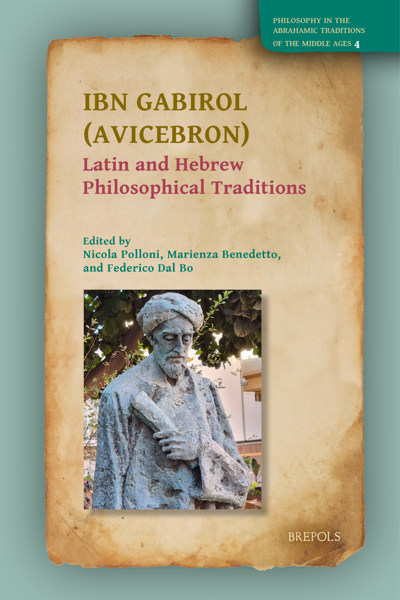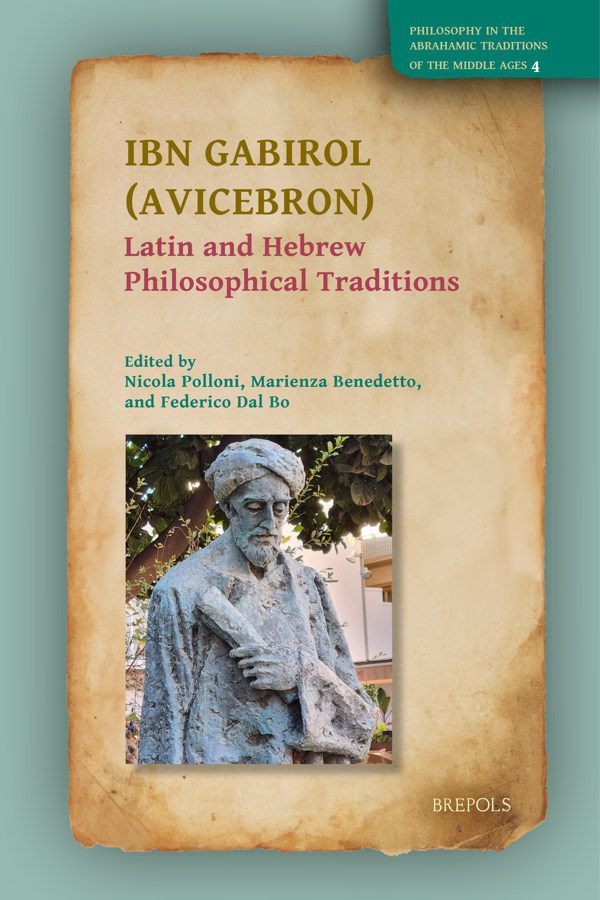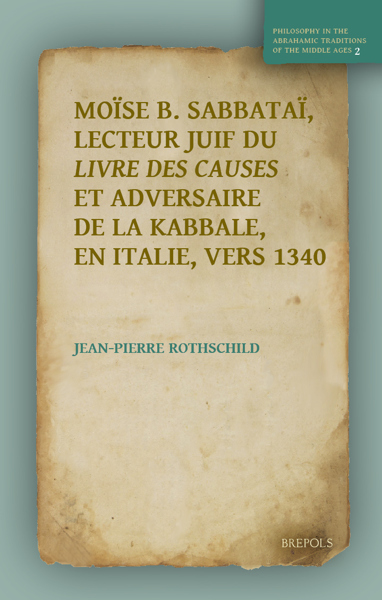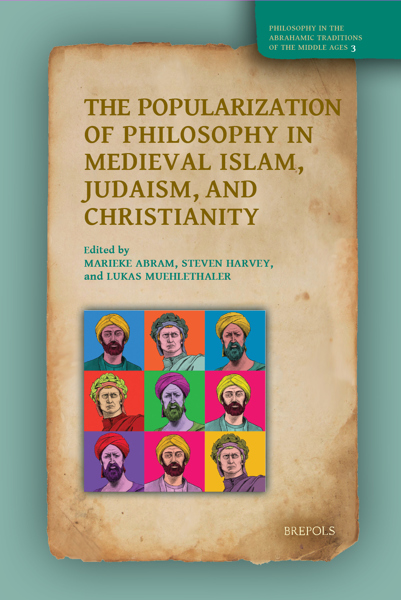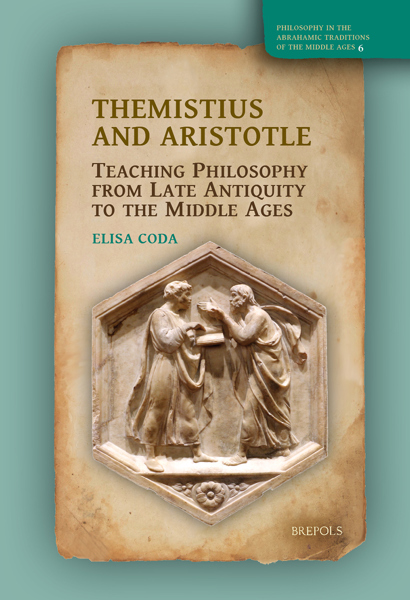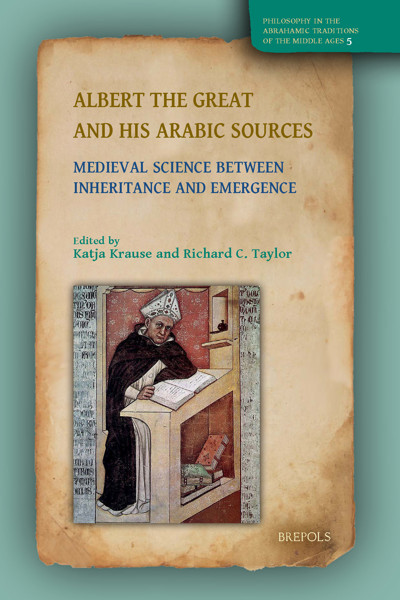
Ibn Gabirol (Avicebron)
Latin and Hebrew Philosophical Traditions
Nicola Polloni, Marienza Benedetto, Federico Dal Bo (eds)
- Pages: 412 p.
- Size:156 x 234 mm
- Illustrations:9 tables b/w.
- Language(s):English
- Publication Year:2023
- € 115,00 EXCL. VAT RETAIL PRICE
- ISBN: 978-2-503-60552-4
- Hardback
- Available
- € 115,00 EXCL. VAT RETAIL PRICE
- ISBN: 978-2-503-60553-1
- E-book
- Available
Featuring chapters by renowned experts on Hebrew and Latin philosophy, this volume explores one of the most important thinkers of the Middle Ages, the Jewish philosopher Solomon Ibn Gabirol (Avicebron), and his impact on medieval readers and critics, both Latin and Hebrew.
Nicola Polloni is a senior researcher at the Institute of Philosophy of KU Leuven, Belgium. His works are mostly focused on hylomorphism and theories of matter in the Middle Ages.
Marienza Benedetto is Associate Professor of Medieval Philosophy at Università di Bari, Italy. Her expertise is on medieval Hebrew and Latin philosophy.
Federico Dal Bo is a researchassistant at the University of Heidelberg, Germany. His studies have expanded on Jewish philosophy and the kabbalistic tradition.
One of the most important thinkers of the Middle Ages, the Jewish philosopher Solomon Ibn Gabirol (known in the Latin Middle Ages as ‘Avicebron’) greatly contributed to the history of metaphysics. His most famous work, the Fons vitae, was the source of sophisticated, radical doctrines (like universal hylomorphism and the plurality of substantial forms) that were rigorously debated in the Latin world for centuries.
Breaking a long period of scholarly neglect of his thought, this volume scrutinises Ibn Gabirol’s philosophical contributions by disentangling his original theories from the misconceptions originated by his medieval readers and critics, like Thomas Aquinas and Albert the Great. The first part of the volume expands on the Latin translation of Ibn Gabirol’s philosophical work, the Fons vitae, from which many of these misconceptions seems to have originated. The second part focuses on the sources used by Ibn Gabirol and reconstructs the philosophical framework of his reflections. The final two parts of the volume are dedicated to the influence on Ibn Gabirol’s thought on the Latin and Hebrew traditions, respectively.
Authored by some of the most renowned worldwide experts on Hebrew and Latin philosophy, the cutting-edge contributions included in the volume give a lively picture of a complex yet fascinating medieval philosopher and his unique interpretation of the universe.
Introduction
Part I: Translations and Versions of the Fons vitae
1. Federico Dal Bo, The Sephardic Task of the Translator: Ibn Falaquera’s Paraphrastic Hebrew Translation of Ibn Gabirol’s Fons vitae
2. Nicola Polloni, Misinterpreting Ibn Gabirol? Questions, Doubts, and Remarks on a Problematic Latin Translation
3. Mária Mičaninová, Some Insights into the Manuscript Tradition of Fons vitae
Part II: Sources and Parallels
4. Alisa Kunitz-Dick, The Role of Place in the Metaphysics of the Fons vitae
5. Sarah Pessin, Chains, Trees, and the Spirit-to-Body Boundary: Substance, Spiritual Matter and the Principle of Matter as Higher Cause
6. Mauro Zonta, A Note on Galen’s Philosophical Writings as a Source for Ibn Gabirol
Part III: The Latin Tradition
7. María Jesús Soto-Bruna, Rational Discourse Surrounding Creation: Ibn Gabirol and Dominicus Gundissalinus
8. John A. Laumakis, Solomon Ibn Gabirol and William of Auvergne
9. Evelina Miteva, The Reception of Ibn Gabirol’s Fons vitae in Albertus Magnus
10. Fabrizio Amerini, Thomas Aquinas and Avicebron
11. Marienza Benedetto, Avicebron According to Giles of Rome: A ‘Mortal’ Author
12. Caleb G. Colley, John Pecham, Interpreter of Ibn Gabirol
13. Ze’ev Strauss, ‘Lord, show us the One, and it is enough for us’: Meister Eckhart’s Reception of Ibn Gabirol’s Metaphysics of the One
Part IV: The Hebrew Tradition
14. Cecilia Cavaleiro de Macedo, Ibn Gabirol: A Metaphysics of the Flux?
15. Warren Z. Harvey, Philosophy and Poetry in Ibn Gabirol
16. Federico Dal Bo, Ibn Gabirol between Philosophy and Kabbalah: A Comprehensive Insight into the Jewish Reception of Ibn Gabirol
17. Roberto Gatti, Models of Emanation in Medieval Jewish Philosophy: Ibn Gabirol, Maimonides, and Gersonides
Index
